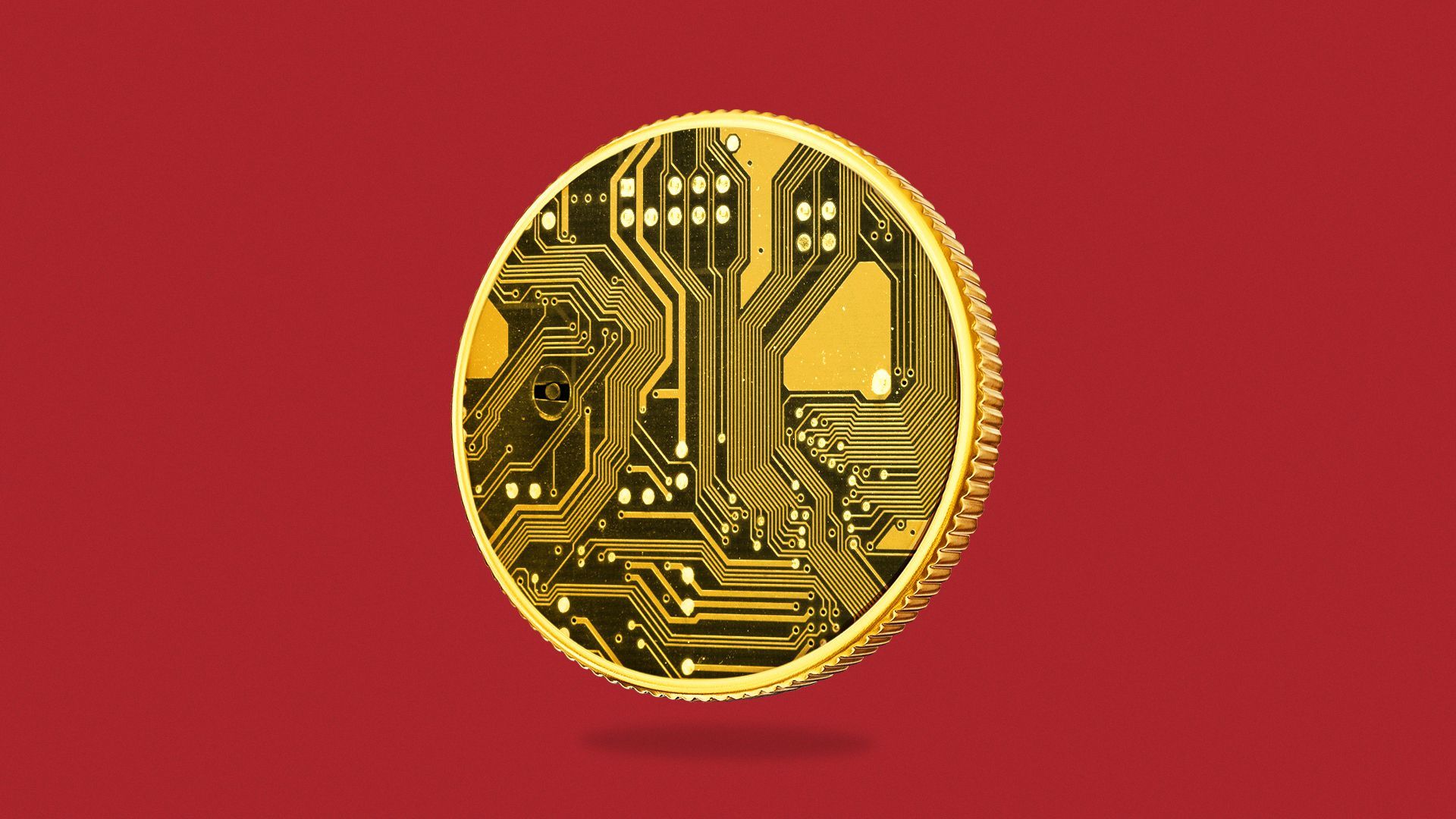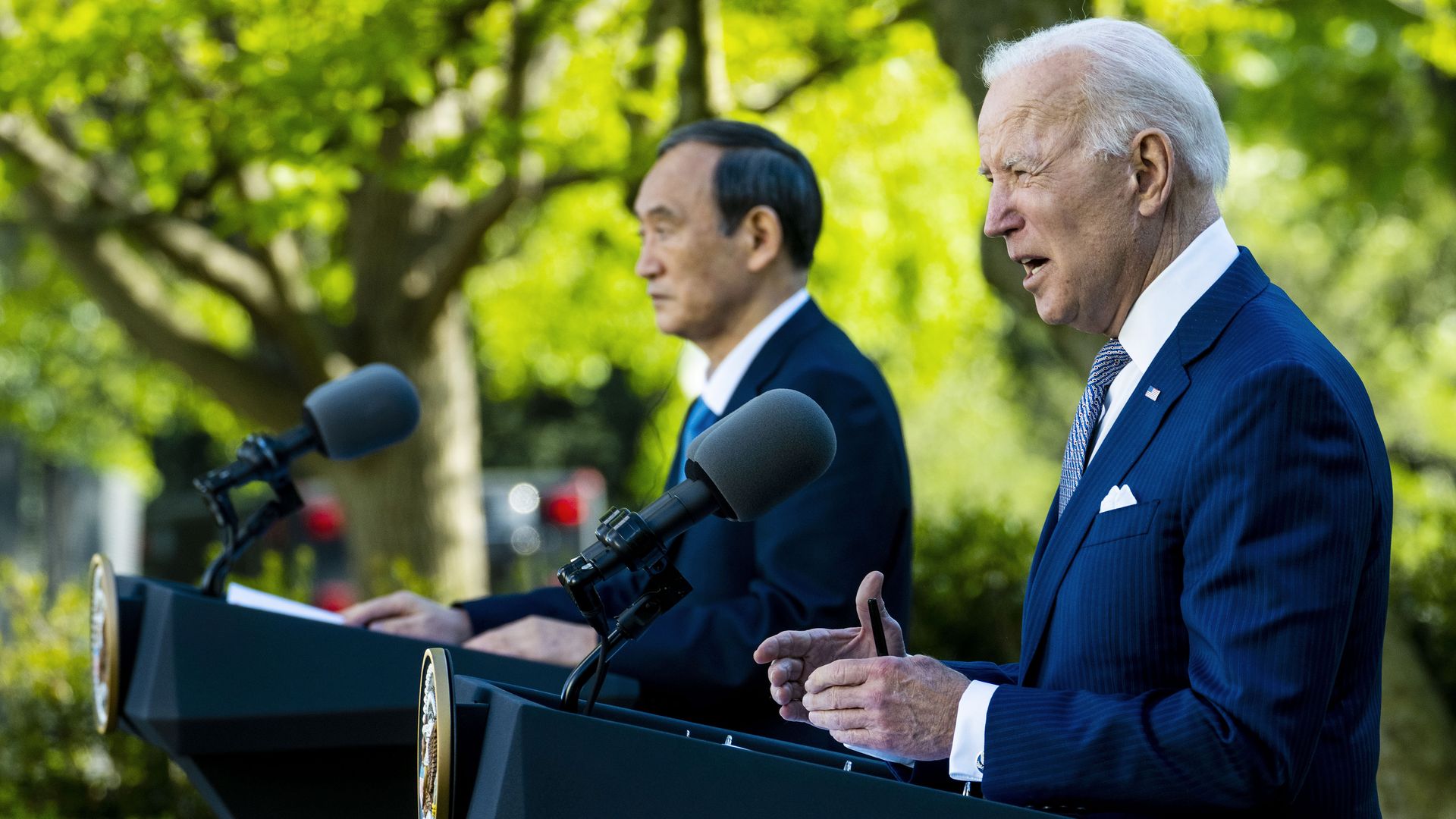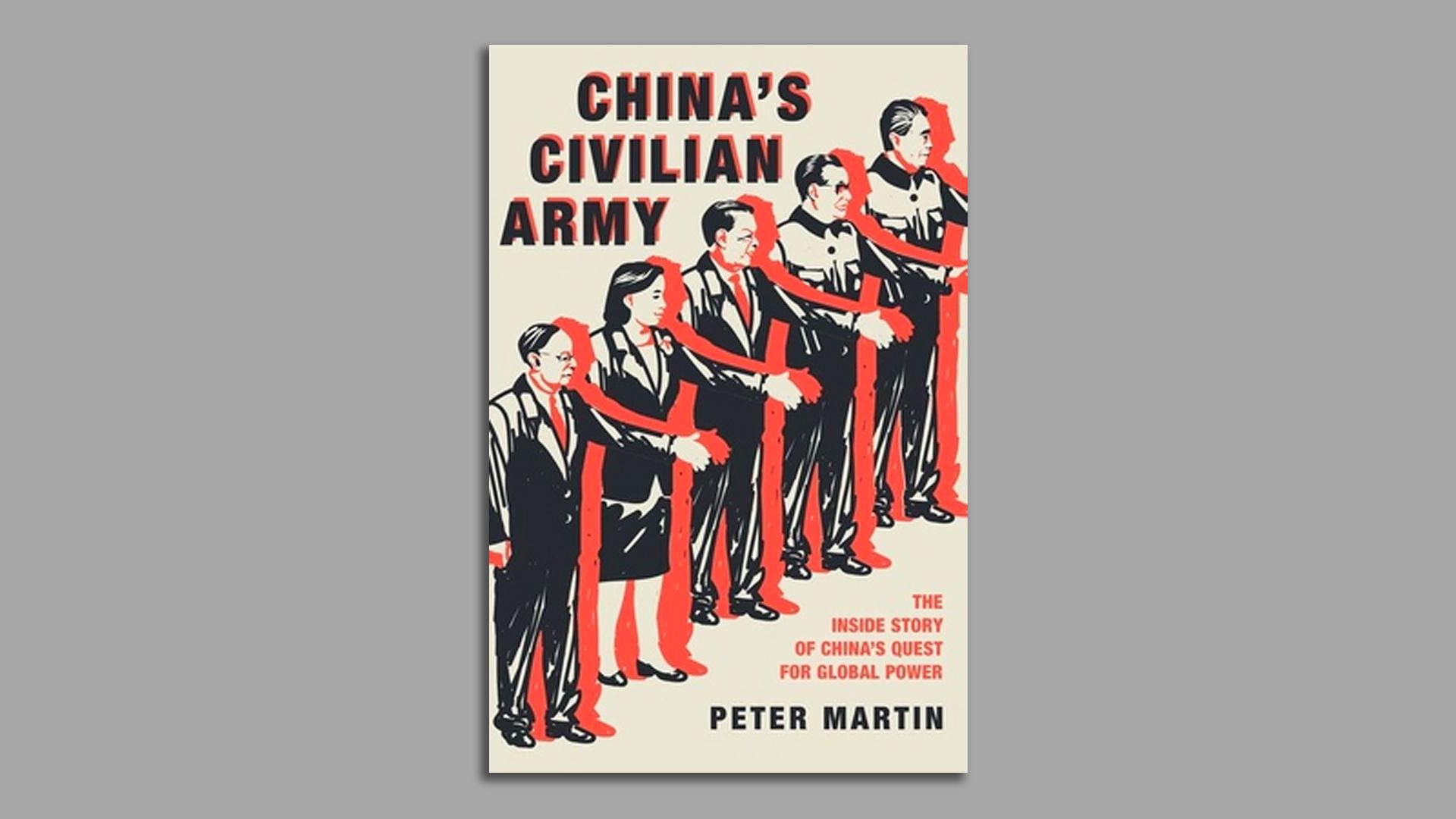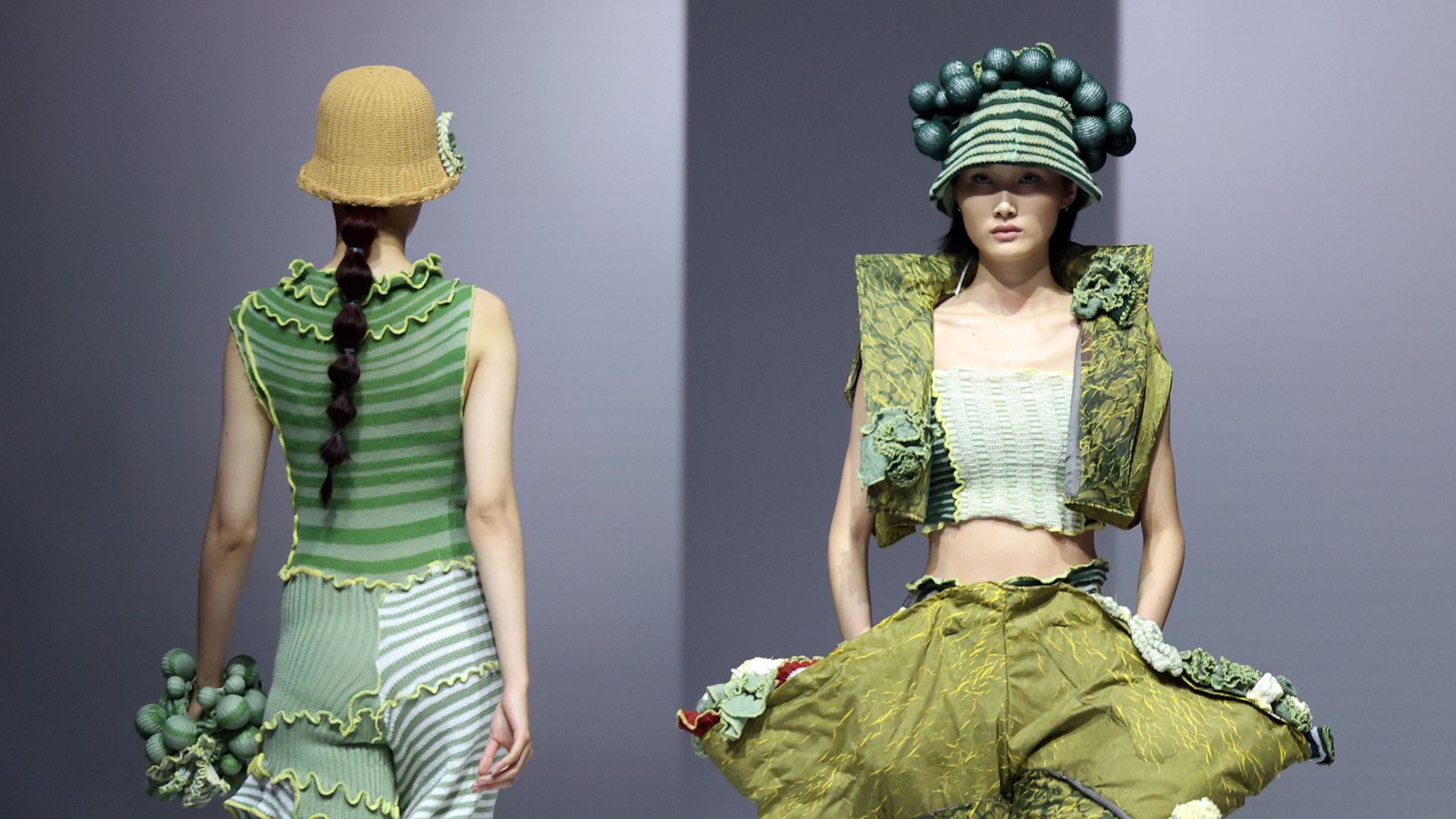April 20, 2021
Welcome back to Axios China. Today, we're looking at China's new digital currency, a new book on China's wolf warrior diplomats, Shanghai fashion and lots more.
- You can send comments and suggestions my way. Email me at [email protected] or just hit reply.
Today's newsletter is 1,717 words, a 6-minute read.
1 big thing: China leads the world with new digital currency

Illustration: Rae Cook/Axios
In a push to dominate global financial technology, the Chinese government is aiming to roll out the world's first state-backed digital currency.
Why it matters: China's new currency could set global standards for the use of national digital currencies — and give Beijing unprecedented visibility and control over domestic financial transactions.
- At least 60 countries are exploring the use of an official digital currency, but China is furthest along in making those plans a reality, while the U.S. has largely sat on the sidelines.
What's happening: The Chinese government has started pilot programs in Beijing, Shanghai and other cities that give small amounts of the currency, known as Digital Currency Electronic Payment (DCEP), to residents on a lottery system, with a limited number of retailers participating.
The big picture: Rolling out a national digital currency offers several advantages:
- Improving efficiency in the financial system. Cash and coins are inefficient and expensive to store.
- Reducing systemic risk. “The existing system is owned by private companies. Should Alipay or WeChat Pay [go] bankrupt, which is extremely unlikely, it creates systematic risk,” Trivium China analyst Linghao Bao told CNBC. A government alternative would provide a layer of security.
- Spurring innovation. A state-backed digital currency could potentially provide a host of new opportunities for businesses, tech companies and trade.
But it isn't just about efficiency and innovation. Chinese officials have made it clear that they view the digital currency as a key staging ground for global geopolitical competition, according to a January report by Yaya Fanusie and Emily Jin of the Center for a New American Security.
- “Fintech is the commanding heights of future global financial competition," Chinese central bank deputy governor Fan Yifei said in November 2019. “Whoever grasps this advanced productive capability will possess the strongest core competitiveness in finance."
In the hands of an authoritarian government, a digital currency also offers unprecedented surveillance and control. “Never before has a government ever had access to individual user transactions directly. Technology hasn’t allowed that,” Fanusie told Axios.
- "DCEP offers a direct route for the government to cut a person off from payments, from their funds, from their accounts. Right now, the government has to go through a private company or a bank to do that."
- This capability could be used to reduce criminal abuse of the financial system, but also, in theory, to monitor and shut down the accounts of dissidents, human rights activists, persecuted groups such as Uyghurs, and others engaging in noncriminal behavior that the Chinese Communist Party may want to suppress.
What to watch: Though DCEP could help internationalize the renminbi to a moderate degree, it's unlikely to challenge the U.S. dollar anytime soon.
- But international DCEP transactions could bypass SWIFT, the most widely used international payments system, making it easier for people and governments to evade U.S. financial sanctions.
Go deeper: What central bank digital currencies mean for crypto
2. Biden and Suga announce "new era" in U.S.-Japan ties

President Biden and Prime Minister Yoshihide Suga hold a news conference at the White House, April 16. Photo: Doug Mills/Pool/Getty Images
The United States and Japan released a joint statement after President Biden and Prime Minister Yoshihide Suga met in Washington last week to announce "a new era" in U.S.-Japan relations.
Why it matters: The show of unity is a clear signal that both countries are eager to show Beijing that democracies are still setting the rules in the Indo-Pacific region.
What they're saying: "Together we pledge to demonstrate that free and democratic nations, working together, are able to address the global threats from COVID-19 and climate change while resisting challenges to the free and open rules-based international order," the statement says.
- "Through this new era of friendship between the United States and Japan, each of our democracies will grow stronger still."
Between the lines: The statement only mentioned China a few times, underscoring the Biden administration's efforts to make effective global leadership, rather than direct confrontation, its primary strategy in countering Beijing.
- Biden and Suga also announced two new partnerships, one to fight climate change and one to strengthen global economic recovery.
Beijing's response: The Chinese Embassy said in a statement that the U.S.-Japan announcement went “far beyond the scope of normal development of bilateral relations.”
- "It cannot be more ironic that such attempt of stoking division and building blocs against other countries is put under the banner of 'free and open,'" the embassy added.
3. China is the world's biggest vaccine producer and exporter


The world crossed a coronavirus vaccine milestone last week: Over 1 billion doses have now been produced, Axios' Dave Lawler writes.
The big picture: Production continues to ramp up quickly. While it took several months to reach 1 billion doses, we should hit 2 billion by the end of May, according to data from Airfinity, a science information and analytics company.
- China is the biggest producer and easily the biggest exporter, particularly now that India is curbing exports to fight a brutal second wave there.
- Russia, Switzerland, South Korea, Brazil and South Africa are all producing doses but lag behind the five producers on our chart.
- The U.S. has kept nearly all of its supply for domestic use, but it expects to become a major exporter once domestic needs are met.
The U.S. has also administered the most doses to date with 23% of the global total, according to Our World in Data.
- By the numbers: 21% of all vaccinations have been in China, 14% in India, 5% in the U.K. and 4% in Brazil. Africa has administered just 1.6% of the total.
4. Catch up quick
1. The U.S. and China agreed to work together to tackle global climate change. Go deeper.
2. Biden is close to selecting veteran diplomat Nick Burns as China ambassador. Go deeper.
3. Bipartisan legislation to reduce U.S. dependence on China for critical minerals was introduced today. Go deeper.
- "Our capacity to manufacture essential technology for our national defense and economic prosperity will remain in danger as long as we remain dependent on China," Rep. Lance Gooden (R-Texas) told Axios. "We must start producing these critical minerals here at home and producing in America first."
4. China's economy grew at its fastest quarterly rate ever in the first quarter of 2021, CNN reports.
5. China is expected to approve the BioNTech COVID-19 vaccine in June, Bloomberg reports.
5. New book explores origins of China's wolf warrior diplomacy

Image: Oxford University Press, 2021
Over the past two years, China's previously reticent diplomats have taken to Twitter and the airwaves to feature a raft of highly nationalistic and sometimes combative positions, often directly damaging their relationships with their host countries. A new book explains this shift in behavior.
The big picture: An increasingly tense political environment at home, combined with a growing belief that China's time has come, has convinced many Chinese diplomats that the safest way to advance their own careers and their country's interests is through displays of patriotism.
Meetings with Chinese diplomats can often feel scripted and formal, and it's difficult to develop the kind of personal working relationships that are common among diplomats from many other countries.
But in his new book, "China's Civilian Army: The Making of Wolf Warrior Diplomacy," Bloomberg reporter Peter Martin paints a deeply human portrait of China's emissaries, pulling back the veil on their motivations and struggles.
- Martin draws on dozens of interviews and more than 100 Chinese-language memoirs of former Chinese Foreign Ministry officials, digging up behind-the-scenes anecdotes and mining the often-stilted formal writing for occasional glimpses into the personalities and true feelings of China's diplomats as they navigated career, politics, bureaucracy and the rest of the world.
- Chinese diplomats may act differently than officials from many other countries, Martin told Axios in an interview, but "they’ve got a comparable set of anxieties about their careers, and the system, and how their families fit into things. It’s just that the system sets them up with a different set of incentives than Western diplomats and thus they behave differently."
The book is a masterful retelling of modern Chinese history through the lens of China's diplomats, following top Communist Party cadre Zhou Enlai as he seeks to build a Foreign Ministry from the bottom up after the 1949 founding of the People's Republic.
- The book's title comes from a phrase that Zhou used to describe his vision of the Foreign Ministry as a "civilian army" that emulated the strict discipline and ideological dedication of the People's Liberation Army.
What's happening: "The impulse for Chinese diplomats to follow Xi's lead is rooted in fear as well as ambition," Martin writes. "The easiest way for diplomats to work towards Xi's wishes is to assert Chinese interests forcefully on the world stage."
- "As the domestic political environment becomes increasingly tense, and there is more focus on one individual leader at the top and more focus on ideology throughout the system, Chinese diplomats start to behave in ways that they feel will advance their careers and manage uncertainty. This is entirely consistent with what has gone on in the past," Martin told Axios.
- What's different this time, Martin said, is that the Chinese leadership is now convinced that the West is in decline and that China's time has come.
- "Because of this confluence of factors, it makes most sense from their perspective to be very combative in the way they defend China."
Go deeper: Read the full story
6. What I'm reading
Words matter: Yes, Xinjiang is an intentional genocide (Foreign Policy)
- Why it matters: The United States "cannot have a successful China policy if it is not grounded in a realistic assessment of the Chinese Communist Party’s (CCP) ambitions and methods — and the atrocities that have resulted because of them," writes Peter Mattis, former senior staffer at the Congressional-Executive Commission on China.
Follow the money: Reassessing the landscape for Chinese investment in North America and Europe (Baker McKenzie)
- Watch the Atlantic Council panel on this report yesterday to hear more analysis of China's foreign direct investment in 2020.
Crimes in Xinjiang: “Break their lineage, break their roots" (Human Rights Watch)
- This new legal analysis by Human Rights Watch, with the Stanford Human Rights & Conflict Resolution Clinic, finds that the Chinese government is committing crimes against humanity in Xinjiang, including enslavement, torture, imprisonment, sexual violence, persecution, enforced disappearance, and forced transfer of population.
What I'm watching: Do Not Split (Field of Vision)
- The Oscar-nominated documentary about the 2019 Hong Kong protests resulted in Beijing censoring the Oscars in Hong Kong this year, for the first time ever.
- Watch the film here.
7. 1 fun thing: Shanghai Fashion Week

A model walks the runway during a collection show by graduates from Jiangsu College of Engineering and Technology on day 13 of Shanghai Fashion Week. Photo: Xu Peiqin/VCG via Getty Images
Last year, Shanghai Fashion Week was canceled amid the height of China's coronavirus pandemic. But this year's fashion week was a huge success, with more than 100 runway shows and packed audiences, all made possible by China's effective coronavirus response.
What they're saying: “Chinese designers have really benefited,” one boutique designer store owner told Vogue.
- “The people who typically travel and spend money with luxury brands in Europe are finding that Chinese designers live up to that quality, so the pandemic really brought them to the forefront.”